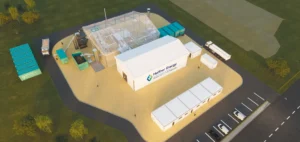Two of Spain’s largest hydrogen consumers, Cepsa and Fertiberia, have signed an agreement to jointly develop a large-scale renewable hydrogen plant in Huelva, using green energy and other renewable gases.
A strategic partnership to meet hydrogen and biogenic CO2 needs
Cepsa and Fertiberia are now strategic partners in the development of a 1 GW electrolysis capacity in Palos de la Frontera, as part of the Green Hydrogen Valley of Andalusia. This valley will have a capacity of 2 GW, with a production of up to 300,000 tons in Cepsa’s energy parks.
The production of green hydrogen will start in 2026 and will be used for Cepsa’s and Fertiberia’s own industrial consumption, as well as for the manufacture of advanced biofuels, ammonia, AdBlue and sustainable crop nutrition solutions.
Industrial synergies between Huelva sites
The energy park La Rábida de Cepsa is adjacent to the Fertiberia facilities in Palos de la Frontera. The partnership will enable us to take advantage of all the existing industrial and operational synergies between the two sites, allowing them to be managed as efficiently as possible.
This agreement will allow Cepsa and Fertiberia to decarbonize their consumption by using green hydrogen, jointly reaching the target set for all of Spain by the end of the decade. Both companies will also consider producing renewable fuels in Huelva and other provinces in mainland Spain.
A circular economy of hydrogen and oxygen in Huelva
The alliance will allow the development of a circular economy of hydrogen and oxygen in Huelva. The construction of this infrastructure will be a pioneering engineering project, linking hydrogen producers to consumers to ensure a more sustainable, efficient and competitive energy supply. It will take advantage of the synergies between all the neighboring industries while guaranteeing their security of supply.
A step forward in Cepsa’s 2030 Positive Motion strategy
This new alliance is part of Cepsa’s 2030 Positive Motion strategy, through which the company is transforming itself to become a reference in the energy transition, leader in sustainable mobility in Spain and Portugal, as well as in the production of renewable hydrogen and advanced biofuels.






















